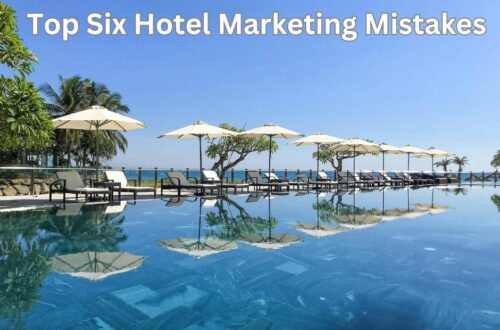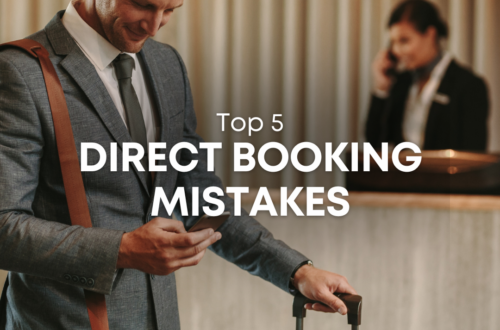
Is the direct booking strategy still worth pursuing?
"Hey, business is slowly but steadily returning," a general manager said. “I don't see why I should have to invest in advertising up front. It may end up costing me more than I pay the agents."
This is a common refrain, and I appreciate it. Direct is difficult for many independent hotels and small groups. If you don't know what you're doing, you could end up spending far more than it would cost to distribute through third parties.
There are several reasons why hotels ignore the direct channel.
- Costs
- Talent
- Keeping up with the ever-changing trends
- OTA domination
- No understanding of distribution costs
- Lack of analysis and data practices
- Past practices: ‘It has always been this way.’
- Inertia
There could be additional reasons. No matter how you try to explain them, they get in the way of your main goal, which is profit maximization.
This means
- You are nothing more than a commodity, a fulfillment partner for the agents, online or offline.
- Totally reliant on market forces.
- Not prepared for your partners diverting business elsewhere
- Have little to no brand awareness.
- Increased distribution costs.
- Lower profitability
- There is no investment in property maintenance or marketing.
The cycle of low investments, maintenance, falling customer satisfaction, falling profits, relying on third parties, and lower-paying segments keeps going.
Here are some fundamental beliefs about direct business that influence my decisions.
- Direct is the most important channel of all.
- The proportion of direct business validates my brand's and strategies' strength.
- My job isn't worth it unless I'm constantly looking for new ways to get more direct business.
- Never stop promoting and enthusing about the direct channel.
- If I play my cards correctly, I can obtain direct business for less than 4% of the revenue generated, as opposed to 15–35% in third-party distribution costs.
- Investment leads to more investment (in the direct channel).
I've handled direct business for properties that could get 50% of their online business through their own website compared to all the other OTAs put together. The pandemic resulted in even more direct business. The challenge now is to maintain direct business as demand returns and competition for each online click increases.
Here is a list of strategies that properties can use. They are listed in order of how easy they are to use, starting with the ones that don't cost anything and moving up to the more advanced ones that require money and a long-term commitment.
Social media: It is critical to balance engaging content with selling content. Concentrate on creating a community and engaging your followers. You generate more direct business when you can measure and improve your leads and revenue.
Responsive website: A mobile optimized responsive website that keeps the key objectives of the website visitors in mind is not difficult to create. Make sure you have key information, visuals, an inquiry form, chat, and a booking engine handy. The website can be at the heart of your direct strategy.
Instant reward/direct advantage: Give guests a reason to book directly by offering an instant reward or a direct advantage. A small discount, a value addition, an upgrade, or the last available room are all simple enough to implement.
A simple loyalty program: For every ten nights booked, Hotels.com provides one free night. What can you do with some inventive thinking?
Front office/guest relations: This is the least used option. What can your front-of-house staff do to connect with guests and encourage them to book directly?
Email marketing: As with social media, balance engaging content with sales tactics. You can get more people to visit your website through regular communication, promo codes, exclusives, direct links to promotional offers, and other similar tactics.
Chats and messaging: An entire generation now considers email to be slow and tedious. Welcome to smartphone messaging. Develop a strategy for engaging and serving guests via their preferred communication channels. Hotels in Southeast Asia already make a lot of money from the Line app.
Google Maps: Maintain your Google Business Profile listing, respond to reviews, post pictures, provide updates, and take advantage of free meta listing through your channel manager or CRS. Eight out of ten visitors use Google to find their way to your website or listing somewhere else.
(Some more details on these low-hanging fruits here.)
Getting more advanced, but still in the low to no cost range. I'll only mention them briefly because each of the following strategies deserves its own post, and this post cannot include them all.
Search engine optimization (SEO): This can be done in-house or outsourced. If you can master your niche, location, or other aspects of your property that attract guests, you could make a lot of money - ‘direct’.
Organic content/blog: You require content for your social media, website, blog, and other platforms. Examine what your visitors are interested in and what motivates them to interact with the content. With organic content, your property attracts a specific audience interested in booking directly.
Social media influencers: It is critical to match your ideal guest with an influencer's followers. If you do this correctly while spacing them out, it can draw more attention to your property/brand and thus direct business.
Videos: The sky is the limit in terms of video creativity. Create a strategy, a timetable, and a method to direct users to your website or other platforms. One piece of advice: if the video is so generic that it can pass off as any other hotel, you are doing it wrong.
Virtual tours: This type of content is still underappreciated in the industry. From what I've seen, using virtual tours on hotel websites has been a great way to get more direct conversions.
Live streaming necessitates some planning, interesting content, and a lot of practice. It helps a lot with engagement and direct bookings if you get it right.
Now, here are the more sophisticated strategies that necessitate investment and a longer-term commitment.
SEM (Search Engine Marketing): Advertising on your own brand/property keywords will be reasonably priced. From there, you can expand with location, experience, destination-specific keywords, and more. Most OTAs take cheap traffic by using keywords that are specific to your property, which costs you direct bookings.
Metasearch advertising: The most important one to get listed on is Google Meta. TripAdvisor, Kayak, Trivago, Skyscanner, and HotelsCombined are the other sites. You can choose from CPC (cost per click), PPS (pay per stay), hybrid, and other models. If properly managed, CPC outperforms the other options in terms of profitability.
Display/ Video ads: The principles for creating videos remain the same as in the previous sections. Visual advertising is a way to get more people to see the content you worked hard to make. If you get geographical and behavioral targeting right, you are funneling more potential guests to direct conversions.
Programmatic advertising allows you to bid for specific audiences with personalized visuals and messaging. Whether you use them for remarketing or to find new customers, an optimized programmatic advertising strategy will bring motivated visitors to your website.
Dynamic personalization: Today's guests are accustomed to receiving personalized recommendations and content. Apps like Netflix, Amazon, and their social media apps magically surface the products and content they are most interested in. Dynamic personalization is now possible on websites, email marketing tools, advertising tools, and virtually all other guest-facing media. You will be more relevant and save them time if you can use this functionality on as many guest touch points as possible. More direct bookings will come your way as a result.
CRM tools and Customer Data Platforms (CDP) have advanced in recent years. Guests will keep coming back to you if you use information from all touch points to communicate well and give them a personalized experience.
Social media tools: You realize after a while that there are so many social media channels that scaling up posting and analyzing performance is difficult. It is time to use aggregation tools such as Hootsuite, Sendible, Buffer, and others. Better analysis would result in more engagement, which would result in a larger community and more direct business.
Points-based loyalty program: This is not for everyone, but if you have the scale and the right tools, a loyalty program will keep your most loyal customers feeling rewarded and returning. If you keep updating your tier-based benefits, you can continue to build a loyal customer base. Larger hotel chains are better at this, and member stays make up a bigger part of their revenue. Others can be more guest-focused and employ clever strategies to keep loyal customers satisfied.
App: These days, it is simple to outsource app development. There are providers who can create a customized app with all of the features that a guest would expect. This one necessitates a significant amount of dedication and effort. Consider how engaged your guests will be if they can use an app to do everything from booking to selecting add-ons, check-in, room service ordering, TV/room controls, communication, room requests, check-out, and more.
---
In my opinion, if a hotel lacks a direct strategy, it lacks a strategy. It is not reassuring to leave hotel distribution to market forces and third parties.
With so many tools at your disposal, it just takes a bit of initiative to get serious about your direct strategy. If you are still unsure, seek assistance, hire talent, wrap your head around it, and get started.
Join the conversation on LinkedIn





